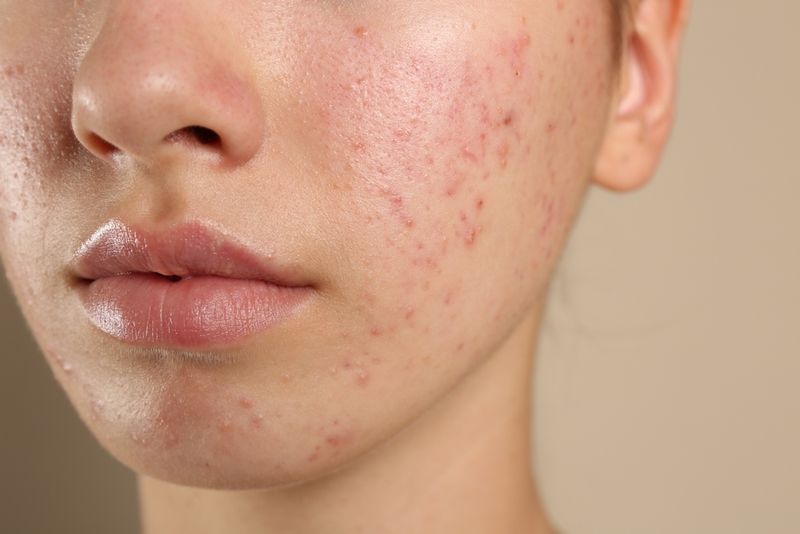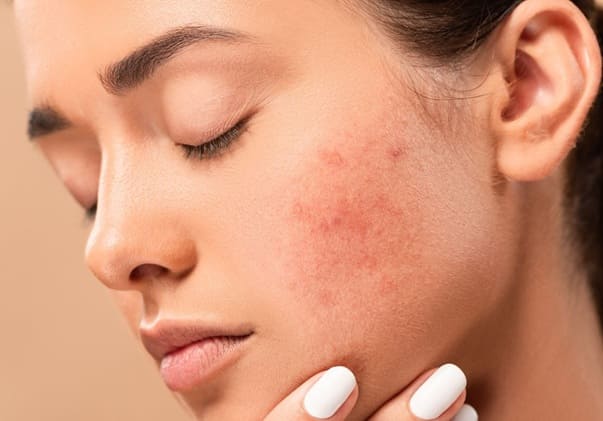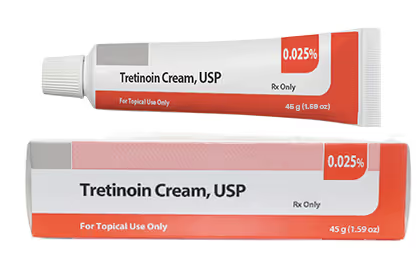When it comes to treating acne, two popular options are Spironolactone and Accutane. Both medications have shown effectiveness in managing acne, but they work in different ways. In this article, we will compare the two treatments to help you make an informed decision about which one may be more suitable for your acne concerns. To evaluate whether or not spironolactone or Accutane is right for you, connect with an online dermatology provider at Honeydew.
Key Takeaways
- Spironolactone and Accutane are both effective treatments for acne, but they target acne through different mechanisms.
- Accutane is a retinoid that shrinks oil glands and decreases sebum production, leading to permanent clearance of cystic acne.
- Spironolactone blocks hormones that can exacerbate acne, making it a suitable option for hormone-related acne.
- Accutane is known for its potential harsh side effects, while Spironolactone is generally well-tolerated.
- Consulting with a dermatologist is essential to determine the most appropriate treatment for your specific acne concerns.
Is Accutane worth it for hormonal acne?
Understanding Accutane and Its Role in Treating Severe Acne
When you’re grappling with severe acne that resists other treatments, Accutane may be a beacon of hope. Known generically as isotretinoin, this powerful oral medication is a derivative of Vitamin A and is particularly effective for nodulocystic acne and other stubborn forms.
Accutane works by targeting the root causes of severe acne:
- It significantly shrinks oil glands
- Reduces sebum production
- Prevents pores from becoming clogged
This comprehensive approach can lead to a permanent clearance of cystic acne for many patients. However, it’s important to be aware of the potential side effects, such as increased sensitivity to the sun, an initial worsening of acne, and strict precautions to avoid pregnancy complications due to its high teratogenic risk.
Analyzing the Efficacy of Accutane for Hormonal Acne
When you’re grappling with the persistent challenge of hormonal acne, Accutane (isotretinoin) may emerge as a potent ally. This oral retinoid is specifically tailored to treat severe scarring acne that stubbornly resists other treatments. By shrinking oil glands and reducing sebum production, Accutane targets the very factors that contribute to acne, preventing pores from becoming clogged and promoting long-term clarity.
The efficacy of Accutane is not just anecdotal; it is backed by clinical studies. Patients often experience a significant reduction in acne lesions, and for many, this can translate into permanent clearance. However, it’s important to understand that results can vary, and the journey to clear skin with Accutane is a commitment:
- Initial flare-ups may occur as the skin adjusts to the medication.
- A full course of treatment typically spans several months.
- Regular monitoring by a healthcare professional is essential to manage potential side effects.
Despite the challenges, for those who have battled with severe acne without success, Accutane offers a beacon of hope. It’s a treatment that has the potential to not only improve skin but also boost self-esteem and quality of life.
Weighing the Benefits Against Potential Side Effects
When considering Accutane for your hormonal acne, it’s crucial to balance the clear skin benefits with the potential side effects. Accutane, a potent retinoid medication, boasts a high success rate of up to 90%. It’s an oral pill, which means no daily creams or complex routines, and its use is often short-term, spanning several months.
However, side effects can be significant. They range from skin dehydration and temporary discomfort to more severe implications that require careful monitoring. Here’s what you should consider:
- The severity of your acne and how it affects your daily life.
- Your medical history and any potential risks associated with taking Accutane.
- The duration and dosage of the treatment as prescribed by your healthcare provider.
Remember, while Accutane may offer a path to clear skin, it’s not without its challenges. Discussing all aspects with your healthcare professional is essential to make an informed decision.
Is spironolactone worth it for acne?
The Mechanism of Spironolactone in Hormone-Related Acne
When you’re grappling with the persistent challenge of hormonal acne, understanding the mechanism of your treatment options is crucial. Spironolactone operates by targeting the hormonal imbalance often responsible for this skin condition. It’s a medication that falls under the category of anti-androgens, which means it works by blocking androgens, such as testosterone, from binding to their receptors in the skin.
Here’s how spironolactone can affect your acne:
- It reduces the production of sebum, the oily substance that can clog pores and lead to acne.
- By diminishing androgen levels, it can decrease the occurrence of acne flare-ups, particularly those that worsen around the menstrual cycle.
- Spironolactone also has some estrogen-like effects, which contribute to its ability to mitigate acne symptoms.
It’s important to note that while spironolactone can be effective for many, it’s not a one-size-fits-all solution. Your dermatologist will consider various factors, including the severity of your acne and your overall health, before recommending spironolactone as part of your acne treatment regimen.
Evaluating the Effectiveness of Spironolactone for Acne Control
When considering spironolactone for acne control, it’s important to understand that it’s an oral medication that specifically targets hormonal fluctuations known to exacerbate acne. Spironolactone is a prescription medication effective for hormonal acne in women, but it’s not a quick fix. It typically takes about 3-6 months to see noticeable results, and consistency is key; the medication should be taken daily as prescribed by your dermatologist.
The treatment journey with spironolactone includes:
- Regular consultations with your dermatologist to monitor progress and side effects.
- Patience, as the full benefits may take several months to manifest.
- An understanding of potential side effects, which your healthcare provider will discuss with you.
While spironolactone can be a game-changer for many, it’s crucial to weigh the benefits against the potential side effects and to follow your dermatologist’s guidance closely for the best outcomes.
You may also like: Low Dose Acutane: What Do You Need to Know
Comparing Side Effects and Long-Term Use with Accutane
When considering long-term acne treatments, it’s crucial to weigh the side effects of medications like Accutane against their benefits. Accutane, a potent vitamin A derivative, is known for its effectiveness in treating severe, scarring acne. However, its potential side effects are significant and may include:
- Dry skin
- Elevated cholesterol and triglyceride levels
- Risk of birth defects
Before starting Accutane, dermatologists require extensive testing, including checks on cholesterol, triglyceride levels, and liver function. During treatment, patients must commit to regular follow-up exams to monitor these parameters. In contrast, Spironolactone, often used for hormone-related acne, targets excess sebum production with a different side effect profile. While it may cause:
- Irregular menstruation
- Breast tenderness
- Fatigue
It generally has fewer severe risks compared to Accutane, making it a viable option for long-term management of acne. Ultimately, the choice between these medications should be made in consultation with a healthcare provider, considering your specific health profile and acne severity.

What is A better option than Accutane?
Exploring Alternative Treatments to Accutane
When Accutane’s side effects seem daunting, or if you’re seeking a gentler approach, exploring alternative treatments can be a wise move. Holistic, natural alternatives have gained popularity for those looking to balance acne hormones and achieve clearer skin. Herbal supplements, such as green tea, zinc, and niacinamide, are often touted for their skin benefits.
Professional guidance is crucial when considering low-dose Accutane or other oral treatments like antibiotics and birth control pills, which can offer effective acne management with potentially fewer side effects. Remember, a tailored treatment plan from a dermatologist is indispensable for addressing the unique aspects of your skin condition.
Topical solutions also present a viable alternative, with ingredients like salicylic acid, benzoyl peroxide, and glycerin being mainstays in acne treatment. These can be used alone or in combination with other therapies to target inflammatory acne effectively.
Assessing the Role of Hormone Therapy and Oral Contraceptives
When considering hormone therapy and oral contraceptives for acne management, it’s crucial to understand their dual nature. Oral contraceptives can be a double-edged sword; while some formulations are effective in treating acne by stabilizing hormonal fluctuations, others may exacerbate the condition. It’s essential to consult with your doctor to find a prescription that aligns with your unique hormonal profile, often opting for low-dose estrogen and progesterone pills.
For those experiencing symptoms of elevated androgens, such as hair thinning or irregular periods, anti-androgen treatments like spironolactone may be recommended. This medication works by blocking the effects of male hormones that can lead to acne flare-ups. However, it’s important to be aware of the potential side effects and to discuss them with your healthcare provider.
Here’s a quick guide to understanding the options:
- Oral contraceptives: Regulate hormonal fluctuations
- Anti-androgens: Target excess male hormones
- Vitamin A derivatives: Reduce sebum production
Remember, the goal is to achieve a balance that minimizes acne without compromising overall skin health. If you’re experiencing severe side effects or if the treatment isn’t effective, don’t hesitate to seek further advice from a dermatologist.
Natural and Topical Solutions for Acne Management
When considering natural and topical solutions for acne management, it’s important to recognize the potential of home remedies and over-the-counter products. Aloe vera, for instance, is renowned for its antibacterial and anti-inflammatory properties, which may help reduce acne and prevent new breakouts.
Here are some topical treatments you might explore:
- Topical Antibiotics such as Clindamycin to decrease inflammation
- Topical Retinoids like Differin or Tretinoin to reduce blackhead and whitehead formation
- Natural exfoliating agents like Glycolic or Salicylic Acid
Remember, while these treatments can be effective, they often require consistent application over several weeks to notice significant improvements. It’s also crucial to be mindful of the ingredients in over-the-counter products, as some may contain harsh chemicals that can irritate the skin or increase sensitivity to sunlight. Pairing these topical solutions with a balanced acne diet can enhance their effectiveness, addressing acne not just from the outside, but also from within.
Is Accutane or spironolactone better for hormonal acne?
Direct Comparison of Accutane and Spironolactone for Hormonal Acne
When you’re grappling with hormonal acne, the decision between Accutane and spironolactone can be pivotal. Accutane, a potent vitamin A derivative, is renowned for its ability to shrink oil glands and reduce sebum production, often leading to permanent resolution of cystic acne. On the other hand, spironolactone acts as an anti-androgen, blocking hormones that exacerbate acne, and is frequently prescribed for its hormonal acne treatments.
- Accutane is typically reserved for severe, scarring acne that is unresponsive to other treatments.
- Spironolactone may be preferred for those with signs of excessive androgens or for patients seeking a less aggressive approach.
Your choice should be informed by a thorough understanding of each option’s mechanism, effectiveness, and side effects. Consulting with a healthcare provider is crucial, as they can tailor treatment to your specific acne type and health profile, considering factors like the presence of bacterial acne or the need for hormonal therapy.
Personalized Acne Treatment: Factors to Consider
When you’re exploring treatment options for hormonal acne, it’s crucial to consider your unique skin type and acne severity. Your dermatologist will play a key role in determining the most suitable treatment, whether it’s Accutane, spironolactone, or another therapy. Here are some factors to keep in mind:
- Your individual health history: Past medical conditions and medication sensitivities can influence treatment choice.
- The severity of your acne: More severe cases may require stronger medications like Accutane.
- Potential side effects: Each medication comes with its own set of possible side effects that you’ll need to weigh.
- Your lifestyle and preferences: Some treatments may fit better with your daily routine and skincare habits.
Remember, what works for one person may not work for another. It’s important to have a thorough discussion with your healthcare provider about all the available options, including non-pharmaceutical alternatives like acne creams, diet adjustments, and laser treatments.
Patient reviews and expert opinions can also provide valuable insights into the effectiveness and tolerability of different treatments.
Expert Opinions and Patient Experiences with Both Medications
When it comes to choosing between Accutane and spironolactone for hormonal acne, expert opinions and patient experiences can offer valuable insights. Dermatologists often have a wealth of experience with both medications and can provide guidance based on the severity of acne and individual patient history. Patient reviews, such as those found on Drugs.com, indicate that Accutane has an average rating of 7.9 out of 10 from a total of 611 reviews for the treatment of acne, with a significant majority reporting a positive experience.
However, it’s important to consider that experiences can vary widely. Some patients may find spironolactone to be a gentler alternative, with fewer side effects, while others may achieve better results with Accutane. Here are a few points to keep in mind when reviewing expert opinions and patient experiences:
- The severity of acne and how it responds to treatment can be highly individual.
- Side effects are a crucial factor in determining the suitability of a medication.
- Long-term outcomes and the potential need for additional treatments should be considered.
Ultimately, the decision should be made in consultation with a healthcare provider, taking into account all the factors that are unique to your situation.
Deciding between Accutane and spironolactone for hormonal acne can be challenging. At Honeydew, we understand the intricacies of acne treatment and offer personalized care to help you choose the right medication. With options for same day/next day appointments and comprehensive membership plans, we’re dedicated to providing you with the support you need. Don’t let acne control your life any longer.
Visit our website to schedule your free consultation and take the first step towards clear skin today!
Conclusion
In conclusion, when comparing skincare treatments, it is important to consider the specific needs and conditions of the individual. Accutane and spironolactone are both effective options for treating acne, with Accutane being particularly beneficial for severe scarring acne that does not respond to other medications. Spironolactone, on the other hand, is a valuable option for addressing hormonal acne by blocking hormones that can exacerbate the condition. Ultimately, the choice between Accutane and spironolactone depends on the severity and type of acne, as well as individual factors such as hormone levels and skin sensitivity. Consulting a dermatologist is crucial to determine the most suitable treatment plan for optimal results.























